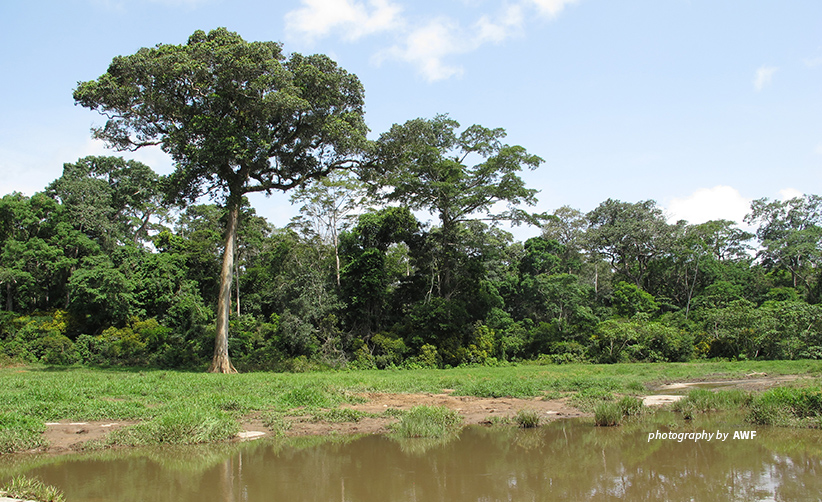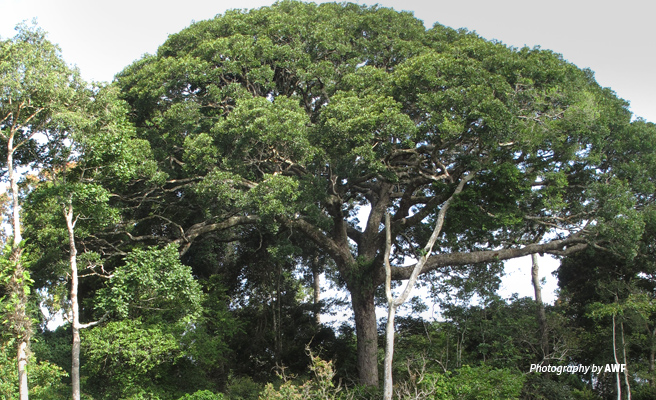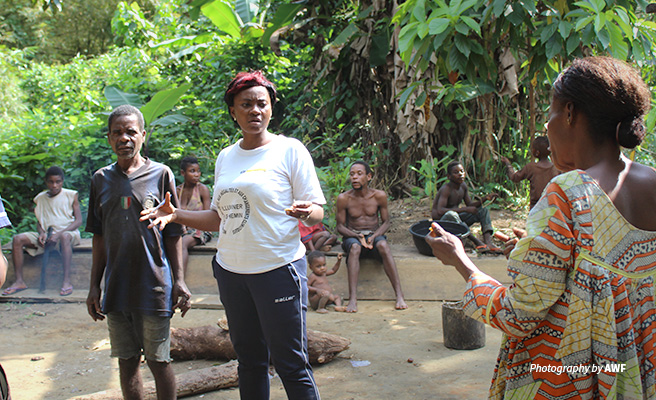Sustainable forest enterprises advance women’s entrepreneurship in Cameroon

For generations, hunter-gatherers have used the trees and plants in Cameroon’s dense tropical forests to sustain their community. Like many indigenous people around the world, their relationship with these biodiversity-rich forests is not exploitative. In the villages neighboring the Dja Biosphere Reserve in south-eastern Cameroon, women are using their ancient botanical knowledge to build sustainable enterprises from non-timber forest products.
From fruits and the seeds within them to the leaves and even the bark, these products are developed from trees native to West Africa and have diverse nutritional, medicinal, and cultural value. Some seeds and fruits are processed into oils and butters used in skincare, added to natural lotions and soaps both locally and in the global cosmetics industry. Based in Kabilone village outside the Dja Faunal Reserve, Tropical Forest & Rural Development has worked closely with local communities to valorize these non-timber forest products as a viable income earner. The organization has also helped communities turn away from illicit bushmeat hunting by introducing sustainable cocoa farming. With support from African Wildlife Foundation and the European Union, Tropical Forest & Rural Development has scaled up their projects, reaching indigenous hunter-gatherers in 23 villages around Dja’s protected area. The non-timber forest product project has now expanded to nearby Nkolekoul and further west to Nyambandé village next to Campo Ma’an National Park.
Results gathered from a baseline socioeconomic study of the villages neighboring the Dja Biosphere Reserve — carried by out AWF in 2017 — show that small business and agriculture are the least common sources of income. More than half of the households surveyed engage in illegal bushmeat hunting and traditional wine-making. Production of indigenous alcoholic beverages is often unregulated, and in some cases exposes consumers to dangerous toxins and severe health risks. Since the survey, AWF and Tropical Forest & Rural Development have worked with the reserve’s Conservation Service to reverse this trend and restore the natural environment as well as the wellbeing of the community.

Conservation-friendly forest enterprises build community resilience with conservation-friendly alternative sources of income
Valuing the role of indigenous communities in conservation
Previously, these communities living near the protected area only collected a few of the products available in the surrounding forests — and only when they were able to find a buyer or access local markets. For many years, they used rudimentary techniques to process the fruits and store seeds, ultimately lowering the quality and value of the products for sale.
Market research and comprehensive interviews with women identified 10 optimal non-timber forest products to build a strong base for sustainable enterprises. The production seasons of each product stretch throughout the year, but the process for each is different and delicate. Fruits from both the bush mango tree and the moabi must be collected within a certain number of days to ensure freshness. In the case of bush mango, kernels extracted from rotten fruits produce a butter with very high acidity and peroxide levels after drying, making it unfit for human use. The Njangsang fruit, on the other hand, requires one week of fermentation before the seed can be retrieved and processed into an oil. Bottled and sold in local markets, these products are bought in bulk to be purified and supplied to cosmetic companies in Cameroon and overseas.
Training women on the best methods to maximize their harvest is crucial in ensuring higher returns. AWF and Tropical Forest & Rural Development have spent months working side-by-side with women in Kagnol and Kabilone in Dja, teaching them the best techniques to process, store, and package their products for the market. The multipurpose moabi has been a popular source of timber, but the slow-producing tree is currently listed as vulnerable on IUCN’s Red List. Instead of logging the moabi, communities can harvest its medicinal bark, eat the fruit, and even extract the precious oil from its seeds. Though less popular, other non-timber forest products like the pea known colloquially as “four sides” for its unique oblong shape, as well as a distinct West African black pepper are the next to be optimized through the sustainable enterprise.
Working closely with Tropical Forest Food and Cosmetics in Yaoundé, AWF is linking hunter-gatherers with reputable buyers across the country by first organizing women into legal associations. Together, they can pool their profits and grow their operations — a modern dryer and storage facility have recently been installed in Nkolekoul with the support of the European Union to minimize spoilage and increase efficiency. Association members also benefit from group sales as well as other services like emergency loans. Tropical Forest Food and Cosmetics through its Value Chain Support Fund is even helping pay the salaries of two teachers at a local school, ensuring that the profits from the social enterprise improve rural education as well as livelihoods.

AWF trains women on the best techniques to process, store, and package non-timber forest products
Replicating conservation-friendly business models in other biodiversity hotspots
Without the technical expertise and equipment to deliver premium products and enable regular access to markets, many indigenous women have been locked in a survivalist cycle with limited means of supporting a reliable source of income. Following a series of trainings in non-timber forest products near Campo Ma’an National Park in southern Cameroon, AWF has helped a core team of women to form a group to invest their collective savings as well as gain access to loans other benefits. To cement their new status as entrepreneurs, the group has appointed a committee to administer key operations of the enterprise.
The women recently traveled from Nyamabandé village, located just outside the national park, to Kabilone II village in Dja, where they learned about challenges and best practices across all elements of their enterprise. Women from Kabilone II have inspired their counterparts in Nyamabandé to remain dedicated and keep improving the collection, processing, and marketing of their products so they can achieve the same success.
Empowering women through sustainable enterprises contributes to the success of AWF’s complementary conservation interventions in Campo Ma'an National Park, which also neighbors a rubber plantation in Niete. Through AWF’s partnership between the Foundation for Environment and Development of Cameroon, we are increasing the capacity of the park’s wildlife management authority to reduce wildlife loss through poaching and bushmeat hunting as well as limit habitat degradation. It is similar to our conservation approach in the Dja Biosphere Reserve, where we have improved biomonitoring to make patrol operations more efficient. Coupled with the mounting challenges posed by industrial and infrastructure development around the protected area, sustainable economic development that benefits neighboring indigenous people is exceedingly important for communities to invest in stewarding the forests of Cameroon.